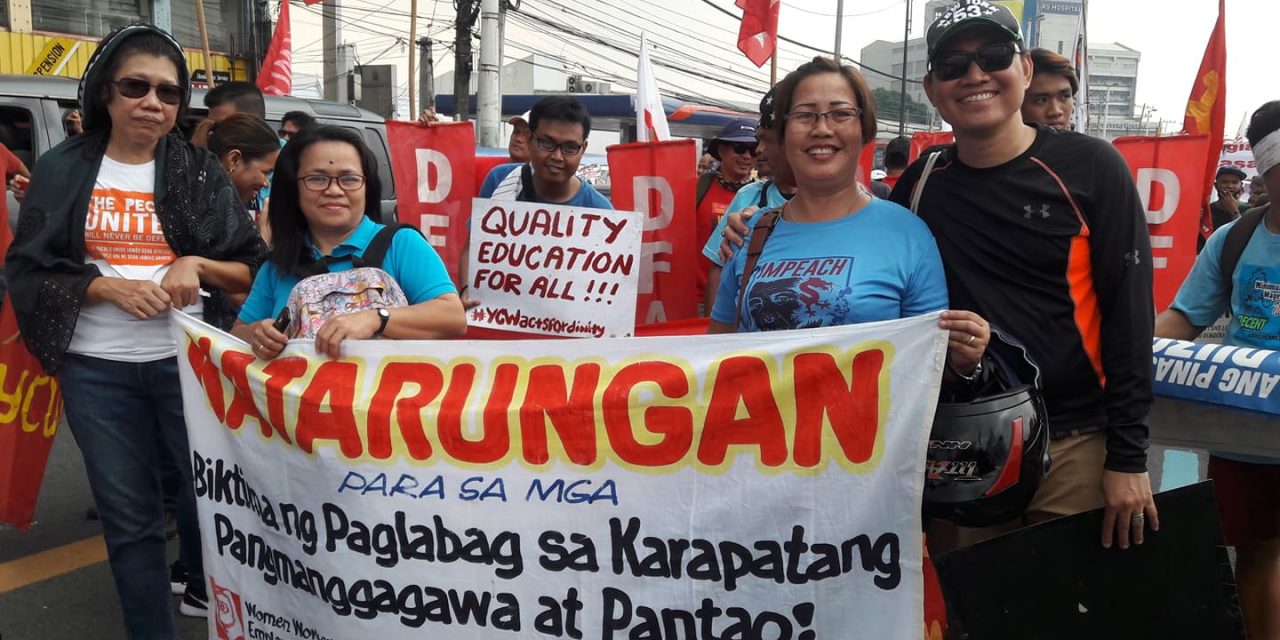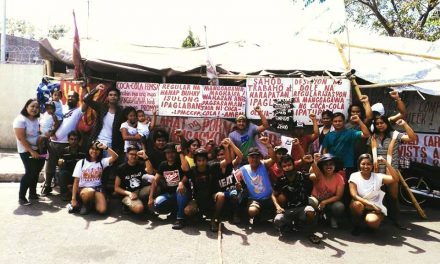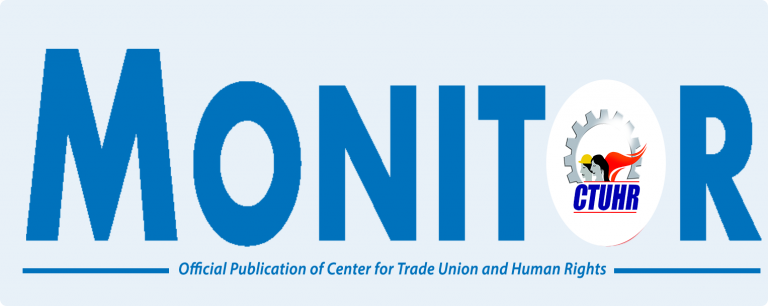“Broken promises, broken further by a combination of laws and practices that Duterte government created while making the Filipino poor poorer and sending the Philippines to indebtedness to China”, says the Center for Trade Union and Human Rights (CTUHR) on the President’s 4thState of the Nation Address (SONA) and 3 years in power.
“Duterte actually inflicted more harm than uplifted the lives of the ordinary Filipinos, especially the working class. He forced us to tighten further our belt with the enactment of the Tax Reform Acceleration and Inclusion (TRAIN) Law and send farmers deeper to destitution with the Rice Tariffication law. His three (3) years in power is marked with 43 killings of workers, informal and agricultural workers and labor rights defenders; 15 major violent dispersal of workers strikes and collective protests this year; vilification and persecution of critics, activists and human rights defenders; allowing China plunder and trampling of country’s sovereignty and high-handed governance that brings the police and military to rule the country,”CTUHR Executive Director Daisy Arago said.
Silencing Critics
Arago reported that when Duterte unleashed his wars on drug, terrorism and insurgency, simultaneous to his threat to kill unions in late 2016. Attacks became more vicious when he issued his Executive Order 70 last December 2018 red-tagging organizations and individuals critical of his policies as communists and communist sympathizers. Murder of unidentified riding in men and `tokhang-style’ EJK became a common pattern for those who fell victims of government hysteria.
Surveillances and harassments became common against known trade union leaders – 17 cases of surveillance and 22 cases of harassment. Moreover, arbitrary arrests and filing of trumped up criminal charges also became a trend to vilify labor rights advocates. Six (6) unionists and labor organizers in fact remain in detention – Marklen Maga, Juan Alexander Reyes, Ireneo Atadero, Julio Lusania, Oliver and Weng Rosales were arrested and charged with trumped-up cases. A peace consultant on economic and socio-cultural rights, Adelberto Silva also remains in jail. Rafael Baylosis who was detained for a year was freed early this year after the cases filed against him were dismissed due to lack of evidence. Two hundred seventy three (273) individuals are slapped with various fabricated criminal charges due to their political beliefs and involvement in labor disputes.
CTUHR also recalled Duterte’s open pronouncements and threats to kill unions and unionists if they will continue to organize and hold strikes, because they kill businesses. “No less than the President himself must always be reminded that organizing unions and strikes are basic worker’s rights, constitutionally and internationally recognized. If such statements is coming from a President, it becomes a policy and it is not surprising that his men, uniformed and non-uniformed are blatantly violating these rights, with impunity,” avers CTUHR.
It could be remembered that Martial Law in Mindanao was used against the striking workers of Shin Sun Tropical Fruits in Davao last June 2, 2017. Other violent strikes and protest dispersals that followed were those of Coca-Coca in Davao; NutriAsia in Marilao, Bulacan last June and July last year and NutriAsia Cabuyao, Laguna a year after; and PEPMACO, also in Laguna over common issues of long-term contractualization, low wages and unsafe working conditions. Hired goons and police brutally dispersed and arrested the striking workers and their supporters and then slapped with trumped up criminal charges.
Government’s Failure to End ENDO and Increase Wages, Fueling Workers Restiveness
With concern for businesses to thrive, while removing all barriers to businesses, Duterte government’s hatred to unions and unionists critical of his policies is an dictum. He disregard the clamor for P750 National Minimum wage, an end to all forms of contractualization and considered them bad for business. His supporters much peddled new law on occupational, safety and health and expanded maternity leave won after decade of people’s struggle are yet to see its implementation as employers express their reservations.
The administration’s combined use of violence and law on its people, including Martial Law in Mindanao, is also plunging the country’s unions to a mere 4.6 percent of an estimated of almost 27 million wage and salaried workers or a total of 4,689,568 workers. Majority or 64,933 (as of Dec 2018) are actually workers’ associations that do not have bargaining powers to improve their conditions in the workplaces.
Arago also highlighted the impact of the Tax Reform Acceleration and Inclusion (TRAIN) Law, that the administration promised would help the poor. “This law plunged the workers and the poor into deeper poverty, cut the amount of food that daily wage can buy. The unemployed and precarious informal workers often sleep at night with just noodles and eggs or just water. As oil prices continuously to soar as high as more than P20/liter when TRAIN law was implemented, the prices of basic commodities logically rose emptying the pockets of the poor,” she added.
If there is something positive that this administration had done, it is emboldening workers to assert their rights despite threats of reprisal. In fact, in Duterte’s 3 years, 155 unions covering 137,288 workers filed their Notices of strikes and 12,687 workers actually participated in 38 strikes, excluding those workers who camped-out outside the Department of Labor and Employment (DOLE) office in Intramuros. This figure already doubles the 15 strikes recorded in Benigno Aquino’s six-year term.
These labor standards violations to extrajudicial killings and policies that favor the capital, revalidate the International Trade Union Confederation (ITUC) Global Rights Index Report 2019 which included the Philippines as one of the 10 worst countries for workers. “The consistent low ranking of the country in Global Rights Index reflects the continual structural failure of the Philippine government to stem the deteriorating state of human rights of the Filipino people. It also raises the necessity to push for the ILO High level Mission to investigate these labor rights violations.” CTUHR ended.###







